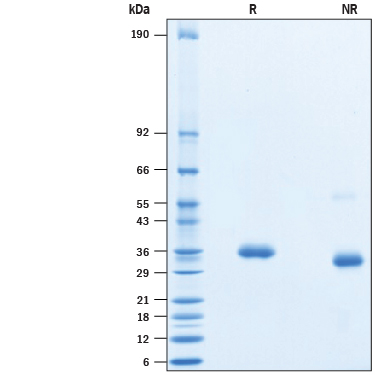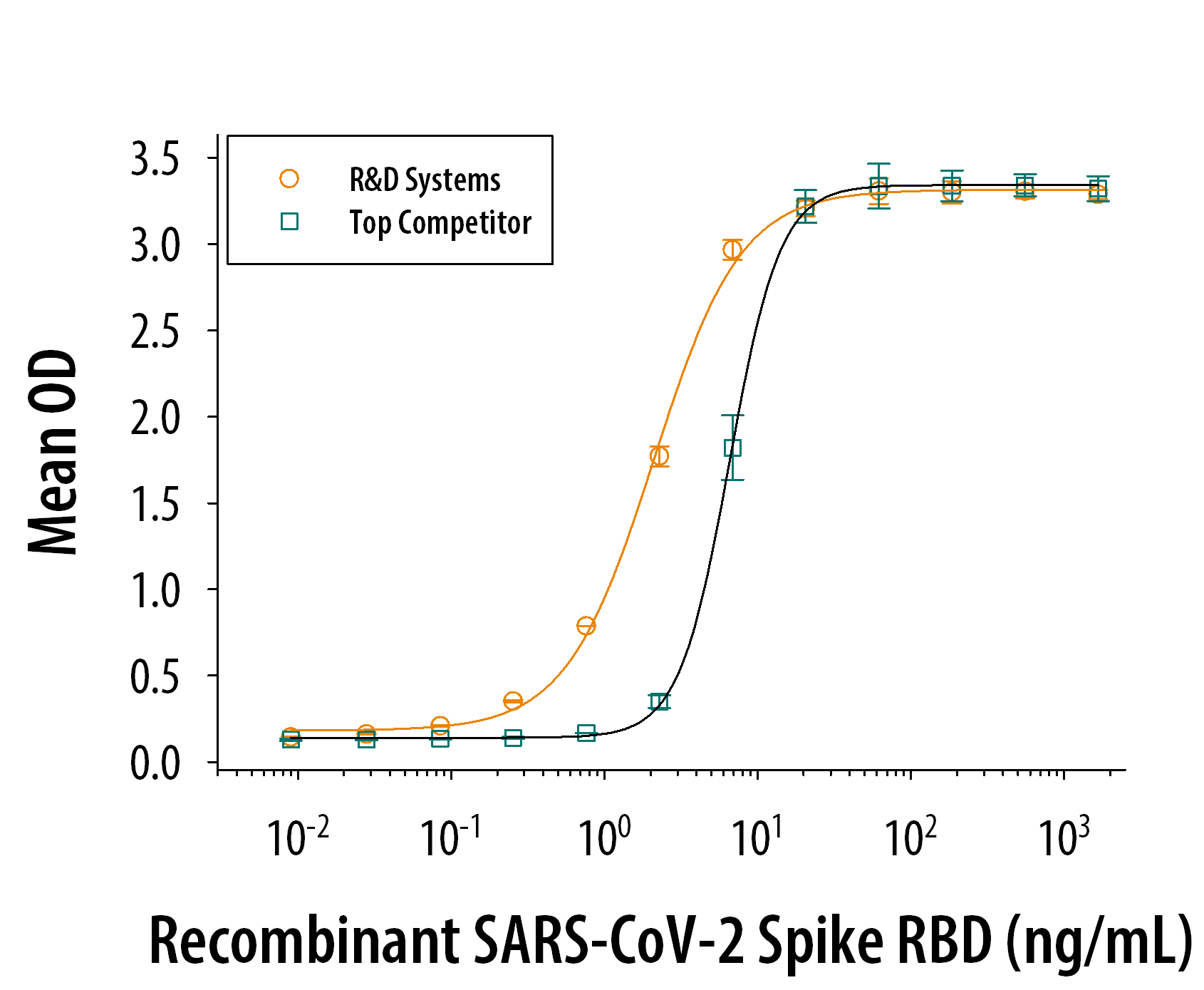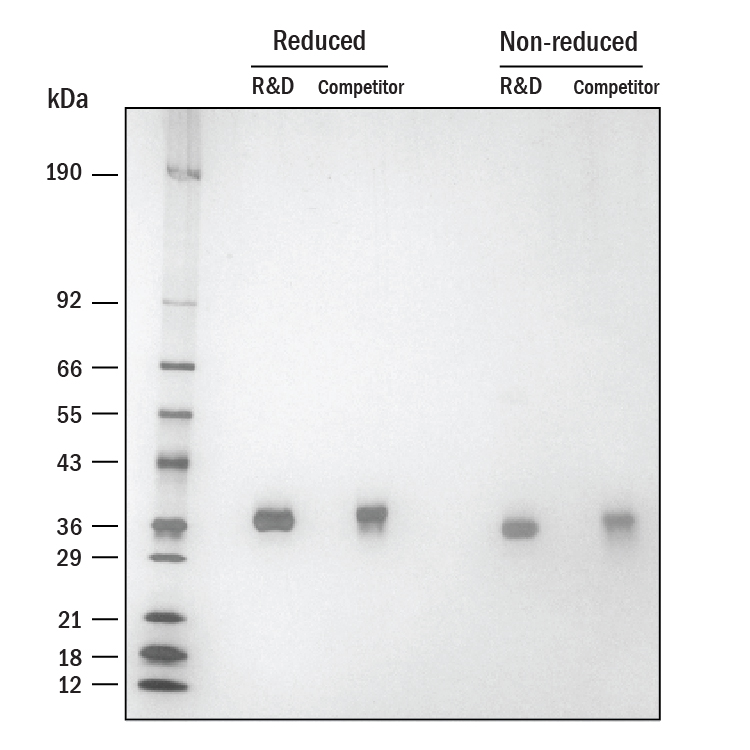Recombinant SARS-CoV-2 Spike RBD His-tag Protein, CF
Recombinant SARS-CoV-2 Spike RBD His-tag Protein, CF Summary
Why choose R&D Systems SARS-CoV-2 Spike RBD Protein?
- Guaranteed Bioactivity and High Purity: Bioactivity tested by functional ELISA and purity determined by SDS-PAGE to be greater than 95%.
- Lot-to-Lot Consistency: Stringent QC testing performed on each lot to ensure consistent activity and purity.
- Bulk Quantities Available: Bulk up and save with large mass quantities to meet your research needs. Supply agreements available, partner with us. Please contact us.
- Most Respected, Most Cited Brand in Proteins: With over 35 years of providing the best recombinant proteins to the scientific community, R&D Systems continues to lead the industry in quality, activity, and purity.
Interested in other Coronavirus proteins including SARS-CoV-2 Spike proteins? View Products
Product Specifications
Arg319-Phe541, with a C-terminal 6-His tag
Analysis
Product Datasheets
Carrier Free
CF stands for Carrier Free (CF). We typically add Bovine Serum Albumin (BSA) as a carrier protein to our recombinant proteins. Adding a carrier protein enhances protein stability, increases shelf-life, and allows the recombinant protein to be stored at a more dilute concentration. The carrier free version does not contain BSA.
In general, we advise purchasing the recombinant protein with BSA for use in cell or tissue culture, or as an ELISA standard. In contrast, the carrier free protein is recommended for applications, in which the presence of BSA could interfere.
10500-CV
| Formulation | Lyophilized from a 0.2 μm filtered solution in PBS with Trehalose. |
| Reconstitution | Reconstitute at 500 μg/mL in PBS. |
| Shipping | The product is shipped at ambient temperature. Upon receipt, store it immediately at the temperature recommended below. |
| Stability & Storage: | Use a manual defrost freezer and avoid repeated freeze-thaw cycles.
|
Scientific Data
 View Larger
View Larger
 View Larger
View Larger
2 μg/lane of Recombinant SARS-CoV-2 Spike RBD His-tag Protein (HEK293 Expressed) (10500-CV) was resolved with SDS-PAGE under reducing (R) and non-reducing (NR) conditions and visualized by Coomassie® Blue staining, showing bands at 28-38 kDa.
 View Larger
View Larger
Recombinant SARS-CoV-2 Spike RBD His-tag Protein (Catalog # 10500-CV) was immobilized on a Biacore Sensor Chip CM5, and binding to recombinant human ACE-2 (Catalog # 933-ZN) was measured at a concentration range between 0.37 nM and 93.5 nM. The double-referenced sensorgram was fit to a 1:1 binding model to determine the binding kinetics and affinity, with an affinity constant of KD=2.149 nM. (Biacore T200).
 View Larger
View Larger
 View Larger
View Larger
SDS-PAGE of 1 µg of R&D Systems Recombinant SARS-CoV-2 Spike RBD (10500-CV) or a competitor’s Spike RBD protein were run under reducing or non-reducing conditions and visualized by silver staining. The R&D Systems Spike protein runs as a sharper, more definitive band than the competitor’s Spike RBD protein.
Reconstitution Calculator
Background: Spike RBD
SARS-CoV-2, which causes the global pandemic coronavirus disease 2019 (Covid-19), belongs to a family of viruses known as coronaviruses that are commonly comprised of four structural proteins: Spike protein(S), Envelope protein (E), Membrane protein (M), and Nucleocapsid protein (N) (1). SARS-CoV-2 Spike Protein (S Protein) is a glycoprotein that mediates membrane fusion and viral entry. The S protein is homotrimeric, with each ~180-kDa monomer consisting of two subunits, S1 and S2 (2). In SARS-CoV-2, as with most coronaviruses, proteolytic cleavage of the S protein into two distinct peptides, S1 and S2 subunits, is required for activation. The S1 subunit is focused on attachment of the protein to the host receptor while the S2 subunit is involved with cell fusion (3-5). Based on structural biology studies, the receptor binding domain (RBD), located in the C-terminal region of S1, can be oriented either in the up/standing or down/lying state (6). The standing state is associated with higher pathogenicity and both SARS-CoV-1 and MERS can access this state due to the flexibility in their respective RBDs. A similar two-state structure and flexibility is found in the SARS-CoV-2 RBD (7). Based on amino acid (aa) sequence homology, the SARS-CoV-2 S1 subunit RBD has 73% identity with the RBD of the SARS-CoV-1 S1 RBD, but only 22% homology with the MERS S1 RBD. The low aa sequence homology is consistent with the finding that SARS and MERS bind different cellular receptors (8). The S Protein of the SARS-CoV-2 virus, like the SARS-CoV-1 counterpart, binds Angiotensin-Converting Enzyme 2 (ACE2), but with much higher affinity and faster binding kinetics (9). Before binding to the ACE2 receptor, structural analysis of the S1 trimer shows that only one of the three RBD domains in the trimeric structure is in the "up" conformation. This is an unstable and transient state that passes between trimeric subunits but is nevertheless an exposed state to be targeted for neutralizing antibody therapy (10). Polyclonal antibodies to the RBD of the SARS-CoV-2 protein have been shown to inhibit interaction with the ACE2 receptor, confirming RBD as an attractive target for vaccinations or antiviral therapy (11). There is also promising work showing that the RBD may be used to detect presence of neutralizing antibodies present in a patient's bloodstream, consistent with developed immunity after exposure to the SARS-CoV-2 virus (12). Lastly, it has been demonstrated the S Protein can invade host cells through the CD147/EMMPRIN receptor and mediate membrane fusion (13, 14).
- Wu, F. et al. (2020) Nature 579:265.
- Tortorici, M.A. and D. Veesler (2019). Adv. Virus Res. 105:93.
- Bosch, B.J. et al. (2003) J. Virol. 77:8801.
- Belouzard, S. et al. (2009) Proc. Natl. Acad. Sci. 106:5871.
- Millet, J.K. and G. R. Whittaker (2015) Virus Res. 202:120.
- Yuan, Y. et al. (2017) Nat. Commun. 8:15092.
- Walls, A.C. et al. (2010) Cell 180:281.
- Jiang, S. et al. (2020) Trends. Immunol. https://doi.org/10.1016/j.it.2020.03.007.
- Ortega, J.T. et al. (2020) EXCLI J. 19:410.
- Wrapp, D. et al. (2020) Science 367:1260.
- Tai, W. et al. (2020) Cell. Mol. Immunol. https://doi.org/10.1016/j.it.2020.03.007.
- Okba, N. M. A. et al. (2020). Emerg. Infect. Dis. https://doi.org/10.3201/eid2607.200841.
- Wang, X. et al. (2020) https://doi.org/10.1038/s41423-020-0424-9.
- Wang, K. et al. (2020) bioRxiv https://www.biorxiv.org/content/10.1101/2020.03.14.988345v1.
Citations for Recombinant SARS-CoV-2 Spike RBD His-tag Protein, CF
R&D Systems personnel manually curate a database that contains references using R&D Systems products. The data collected includes not only links to publications in PubMed, but also provides information about sample types, species, and experimental conditions.
3
Citations: Showing 1 - 3
Filter your results:
Filter by:
-
Novel Enhanced Mammalian Cell Transient Expression Vector via Promoter Combination
Authors: Yoon, S;Park, S;Lee, J;Kim, B;Gwak, W;
International journal of molecular sciences
Species: Human hepegivirus
Sample Types: Cell Lysates
Applications: Western Blot -
Multiformin-Type Azaphilones Prevent SARS-CoV-2 Binding to ACE2 Receptor
Authors: L Jansen-Oll, S Chatterjee, L Jia, F Stahl, C Bär, M Stadler, F Surup, C Zeilinger
Cells, 2022-12-25;12(1):.
Species: Human
Sample Types: Recombinant Protein
Applications: Bioassay -
Humoral Immunogenicity and Reactogenicity of the Standard ChAdOx1 nCoV-19 Vaccination in Taiwan
Authors: JH Chang, JF Chiou, CS Hung, MC Liu, HW Chang, SY Hong, CY Wang, YL Lin, YC Hsieh, CL Chung, YS Su, SS Hsiao, D Liu, JJ Liang, CC Liao, CS Chang, KS Lai, HC Chuang, KL Chien, WC Wu, YG Lee, SE Lin, YK Shen, CF Hsu, JC Wang, SH Hsiao
Vaccines, 2022-02-17;10(2):.
Species: Human
Sample Types: Serum
Applications: ELISA Capture
FAQs
No product specific FAQs exist for this product, however you may
View all Proteins and Enzyme FAQsReviews for Recombinant SARS-CoV-2 Spike RBD His-tag Protein, CF
There are currently no reviews for this product. Be the first to review Recombinant SARS-CoV-2 Spike RBD His-tag Protein, CF and earn rewards!
Have you used Recombinant SARS-CoV-2 Spike RBD His-tag Protein, CF?
Submit a review and receive an Amazon gift card.
$25/€18/£15/$25CAN/¥75 Yuan/¥2500 Yen for a review with an image
$10/€7/£6/$10 CAD/¥70 Yuan/¥1110 Yen for a review without an image
